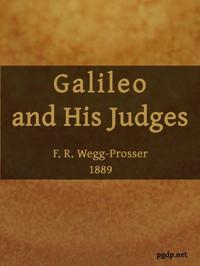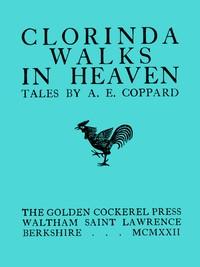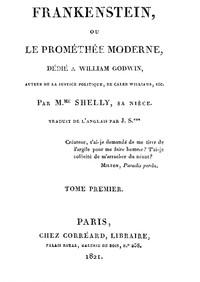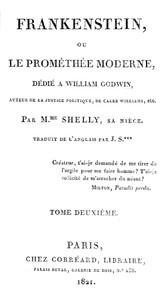Read this ebook for free! No credit card needed, absolutely nothing to pay.
Words: 46475 in 9 pages
This is an ebook sharing website. You can read the uploaded ebooks for free here. No credit cards needed, nothing to pay. If you want to own a digital copy of the ebook, or want to read offline with your favorite ebook-reader, then you can choose to buy and download the ebook.


: Galileo and His Judges by Wegg Prosser F R Francis Richard - Astronomers Italy Biography; Galilei Galileo 1564-1642 Trials litigation etc.; Astronomy Italy History 16th century
GALILEO AND HIS JUDGES.
Before entering on any details relating to Galileo's life and works, I propose to give a brief sketch of the progress of astronomical knowledge up to his time; for without this, one cannot appreciate correctly the value of his contributions to science, a value exaggerated or underrated by different writers, each according to his respective bias.
The primitive conception of the Earth as a vast plain with the ocean flowing round it, and the solid firmament in the sky above it, with the Sun, Moon, and Stars driven across by some mysterious agency, need not be noticed from an astronomical point of view; it appeared naturally in ancient poetry and in the forms of speech adopted and continued by popular usage; but it is not necessary to dwell upon it.
The first astronomers with whom we are acquainted were the Greeks, though it is said by some writers that the Chaldeans and Egyptians were really the original astronomers of the ancient world, and what the Greeks knew was borrowed from them.
The vast majority of men from the earliest times down to the birth of Galileo believed that the Earth was the centre of the universe, round which the Sun, Moon, and Stars revolved every twenty-four hours; round which, also , the Sun had an annual motion, progressing through the various signs of the zodiac; moreover, it had been noticed that the planets moved round the Earth, though at widely differing periods.
Nor has this influence been confined to the schoolmen; it has remained ever since, even to this day and in this country, where in the University of Oxford his great work on ethics is still a standard book of study. At the time of Galileo, such was the reverence felt towards his authority in Italy and in Rome, that the Peripatetici, as those who specially belonged to his school were called, were probably quite as indignant with the revolutionary astronomer for disregarding the teaching of their philosopher, as for going counter to the literal interpretation of Scripture.
It is always useful in scientific subjects to introduce a definition; and this is my definition of the sense in which I employ the word Copernican, that it is simply as opposed to the system in which the Earth is the centre of the visible universe, and the Sun revolving about it. It is, in fact, less accurate but more convenient than the employment of the Greek words heliocentric and geocentric to denote the two systems. Greek words, no doubt, abound in our scientific vocabulary, as the following plainly show: astronomy, geology, geography, barometer, thermometer, microscope, telescope; but these have become naturalised in our language by long use, which heliocentric and geocentric have not as yet been.
After Copernicus there arose an astronomer of great merit, a Dane, Tycho Brah? by name, who attempted to start a fresh system--a modification, in fact, of that of Ptolemy. He made all the planets revolve round the Sun, and the Sun, accompanied by the planets, round the Earth. He deserves great credit for his painstaking observations; but he lived just before the invention of the telescope--or, at least, before it was used for astronomical purposes--and, therefore, was under an infinite disadvantage. His chief objection to the system of Copernicus was one at which a modern astronomer would smile, but which in those days seemed very weighty--namely, the enormous distance at which you must suppose the fixed stars to be situated, if it were true. The philosophers of that age did not like to admit such a waste of space as that which must intervene between the orbit of Saturn and the stars. And, on the Copernican theory, if the stars were not situated at an immense, almost infinite distance, they ought to appear to move in a way they certainly do not. Tycho Brah? was born in 1546. His theory never made much way; it had not, I imagine, sufficient elements of probability to recommend it generally; while the subsequent invention of the telescope, and the works of Kepler and Galileo, coming so soon after Tycho Brah?, prepared the way for that almost universal reception of the Copernican system which we have since witnessed. I shall refer later on to Tycho and his observations.
Such, then, was the state of astronomical theories in the latter part of the sixteenth century. Enlightened men like Copernicus had guessed--not accurately, it is true, but with a considerable approach to accuracy--at the real facts of the case. Tycho Brah? had suggested a system of compromise not likely, in the long run, to satisfy any thoughtful mind; while the bulk of men, even the learned, adhered to the old Ptolemaic scheme. Something, however, now occurred which was destined to work, sooner or later, a complete revolution in astronomy. The telescope was invented, and, at the same time, there arose a man who knew how to use it: that man was Galileo. He was not the inventor of it, for it was first constructed in Holland or Belgium; yet he had the energy and the skill to make a telescope, without having previously seen one, simply from the account he had heard of the instrument. The telescope that he constructed, which still bears his name, was the simplest possible. It was of a form now disused excepting for opera-glasses and for the far more powerful binocular field-glasses with which we are so familiar; but for telescopes properly so called an improved principle has long since been introduced. Galileo was the first man that ever, so far as we know, turned the telescope upon the heavens. How he was rewarded for his pains we shall presently see; and I propose to introduce a narrative of the principal events in his life, since there are no means for forming a judgment so valuable as having the facts of the case clearly before the mind.
To treat of Galileo, and to pass over the events which brought him into collision with the ecclesiastical authorities, would of course be impossible, nor is it easy to touch upon these matters without having some standpoint of one's own--some principle to guide one, some basis from which to argue. I do not shrink from stating that I write from a Catholic standpoint; but without entering minutely into those subtle questions which are the province of the trained theologian.
These two Congregations, as well as several others which it is not necessary to enumerate, still exist, their functions being somewhat modified by the changing circumstances of the age. Their action is for the most part confined to matters of discipline, but they sometimes have questions of doctrine and moral obligation referred to them by the Pope, from whom, of course, they derive all authority that they possess.
I do not here undertake to show the advantage and utility of these Congregations, or of any other institutions connected with the discipline of the Catholic Church. From the remarks I have just previously made, it will be understood that I take all this for granted, and that I feel justified in doing so. Those who differ from me will, I trust, excuse me when they find that this conviction on my part does not interfere with the impartial fairness of my narrative.
Free books android app tbrJar TBR JAR Read Free books online gutenberg
More posts by @FreeBooks

: Clorinda Walks in Heaven by Coppard A E Alfred Edgar - Short stories English; English fiction 20th century


: Alcibiade la critica e il secolo di Pericle lettera di Felice Cavallotti a Yorick figlio di Yorick by Cavallotti Felice Yorick Other - Cavallotti Felice 1842-1898. Alcibiade IT Teatro in prosa


: Frankenstein ou le Prométhée moderne Volume 1 (of 3) by Shelley Mary Wollstonecraft Saladin Jules Translator - Science fiction; Horror tales; Gothic fiction; Scientists Fiction; Monsters Fiction; Frankenstein Victor (Fictitious character) Fiction; Franke




